In the Footsteps of St. Paul: A Pilgrimage...
Trace St. Paul the Apostle’s journey...
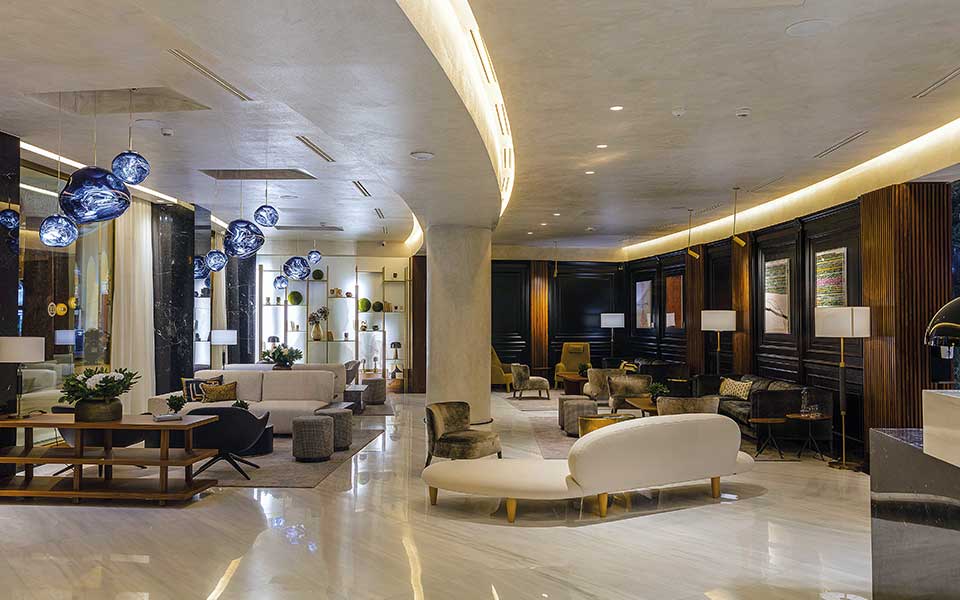
When the Electra Palace covered its facade for a full renovation, it was as if a piece had been removed from Thessaloniki’s most beautiful tableau. Its absence was conspicuous, as the hotel is an essential part of Aristotelous Square, which itself occupies a historical place in the heart of the city.
It was fortunate that the renovation work happened to coincide with the pandemic lockdown. The summer’s return to a degree of normalcy found the hotel ready to receive its first guests, with its elegant spaces radiating messages of optimism for the summer tourist season. The hotel once again lent its notes of grace to the square, opening its windows on countless vistas of the city.
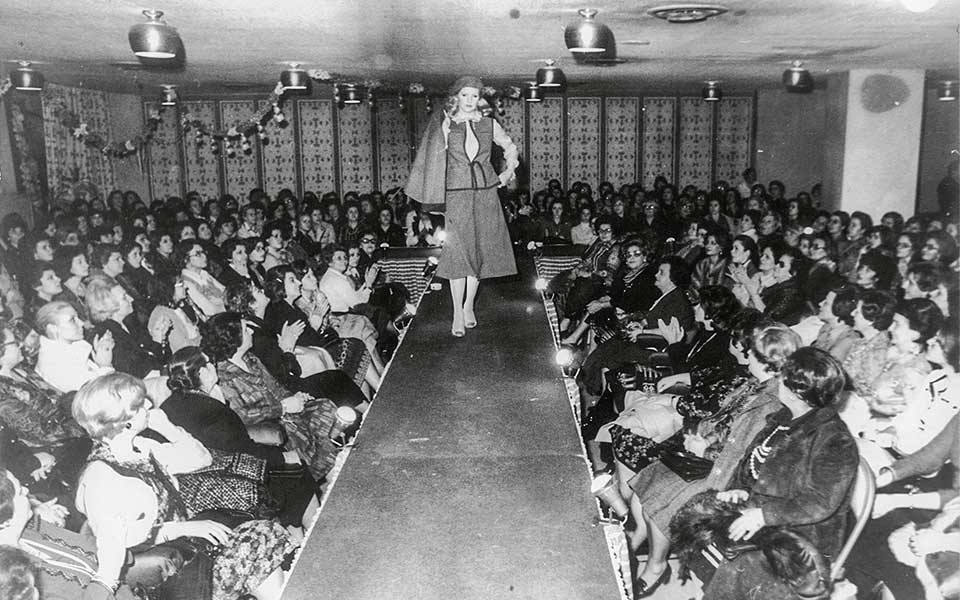
A fashion show held in one of the hotel’s ballrooms in the 1970s.
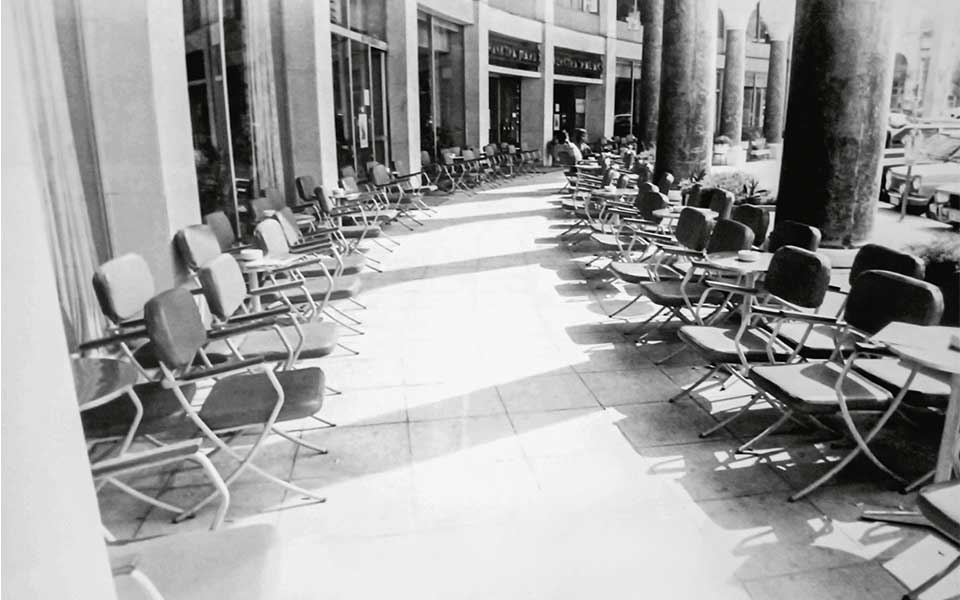
Tables in place for people watching outside the hotel in the 1970s.
An iconic building of historical significance and the centerpiece of the Electra Hotel & Resorts Group, the Electra Palace is celebrating 48 years of operation this year.
While it’s certainly not an old hotel, its beautiful facade, which has been designated a protected work of art, gives the impression that it has always been here, or at least since the city was redesigned following the Great Fire of 1917. In fact, it was one of the last buildings to shape the iconic image of the square we know today. It was erected on the site of an older building – very different in style – which once hosted a police officers’ club.
In contrast to the many soulless structures that replaced elegant older buildings during the antiparochi building frenzy (where property owners could turn over plots or old buildings to apartment block developers in exchange for units in the new structures), such as the Mediteranée on the seafront, here the new owners and architects respected the existing facades of the square with their neo-Byzantine elements inspired by the original post-1917 plans for the square by French architect Ernest Hébrard.
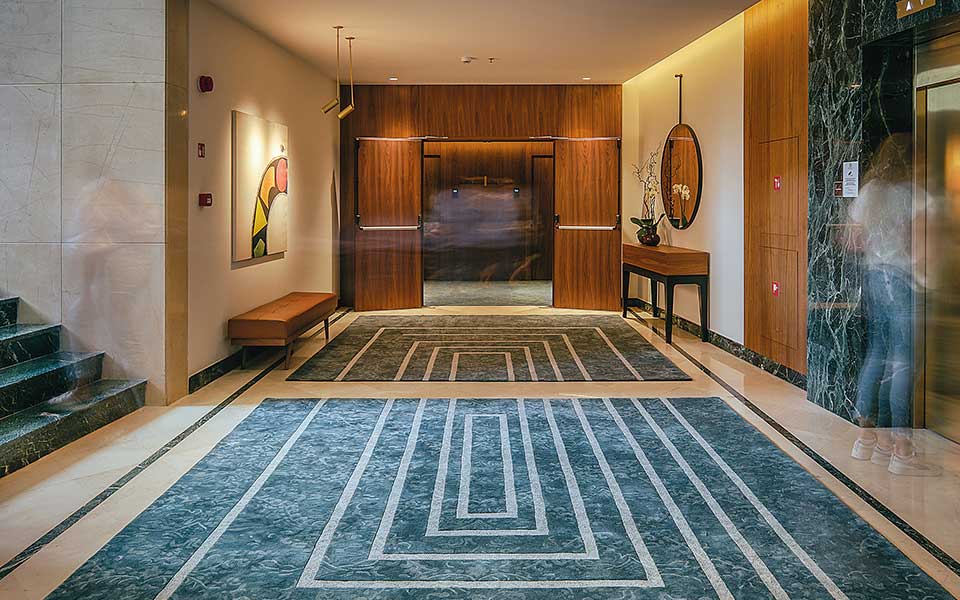
Authentic artworks from contemporary artists are on display in the hotel’s common areas. The hallways feature textiles with designs from masterpieces of the Russian avant garde art movement.
The construction of the hotel was completed in 1972, following a design by Filippos Vokos, completing the semi-circular layout of the square along with the Olympion Cinema – which dates to the 1960s and serves as the headquarters of the Thessaloniki Film Festival.
The hotel’s opening coincided with the beginning of one of the most turbulent decades in modern Greek history, and it had a front row seat to the political and social upheaval of the time as it played out on the square in the form of large anti-dictatorship protests, marches, political rallies following the transition to democracy, open-air concerts, arts events and festivals.
“The creation of the hotel in Thessaloniki was an important move. A most iconic building, it gave our group a great boost,” notes Alkis Sviriadis, the Electra Hotel & Resorts Group’s managing director. He explains that before this last renovation, the previous one was completed in 2002.
“It isn’t that long ago. It could perhaps have waited another seven years but, influenced by the modern lines of the Electra Metropolis in Athens, we decided to redesign it.”
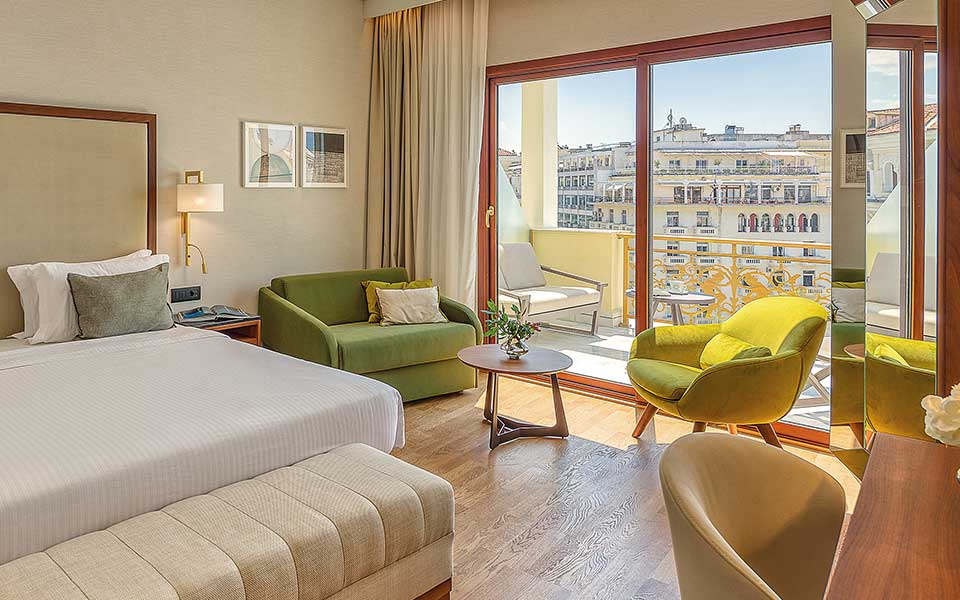
The renovation was rolled out over all seven floors plus the rooftop restaurant, with a total area of 7,500 square meters, and in all rooms (128 rooms, plus 10 suites) that are located on the 2nd to 6th floors, following the highest health and safety standards recommended in light of the COVID-19 pandemic. At the same time, all underground and auxiliary spaces were also upgraded.
“We sensed the historic weight and the vibrant vitality of the public space, and we approached it as a private building whose renovation is as important for the owners as it is for the city,” says the duo of architect Morpho Pananikolaou (Sparch Architects) and interior designer Olivia Siskou.
Picking up the thread from the era when the hotel first opened, and combining that with the “intensity with which the urban space penetrates and converses with the interior spaces,” they sought elements characteristic of the 1970s, when Thessaloniki was growing apace, both economically and culturally (as evidenced by the International Fair, the Film Festival and the achievements in literature, music and design of city artists). This period left a rich imprint on the life of the building and the city.

We enter the hotel for a tour. From the main entrance, the reception and the lobby all the way to the roof garden, it’s clear that the Electra Palace has shed its stuffy formal image. The new look, with references to the ‘70s, marries timeless materials (walnut wood, marble from Dionysos and Tinos, and Nero Marquina marble) with contemporary elements and original design. The art in the hotel offers a foretaste of the Russian avant-garde masterpieces of the Costakis Collection, which visitors can admire at the city’s MOMus–Museum of Contemporary Art.
That idea belongs to Papanikolaou, who collaborated on the project with MOMus. Working with artist Fotini Kariotaki, Papanikolaou put seven elements (one for each floor) from works by three leading proponents of the Russian avant-garde onto fabric, printing drawings by Lyubov Popova, motifs by Ksenia Ender and the color scale of Ivan Kliun, the last of which complements the earthy tones in the foyer and the hallways.
“The experience of standing or moving in space becomes an interaction with the beautiful,” says Papanikolaou. Explanatory texts on the artworks and the history of the Costakis Collection will be included in a small catalogue which will be made available in the hotel for guests to take home with them.
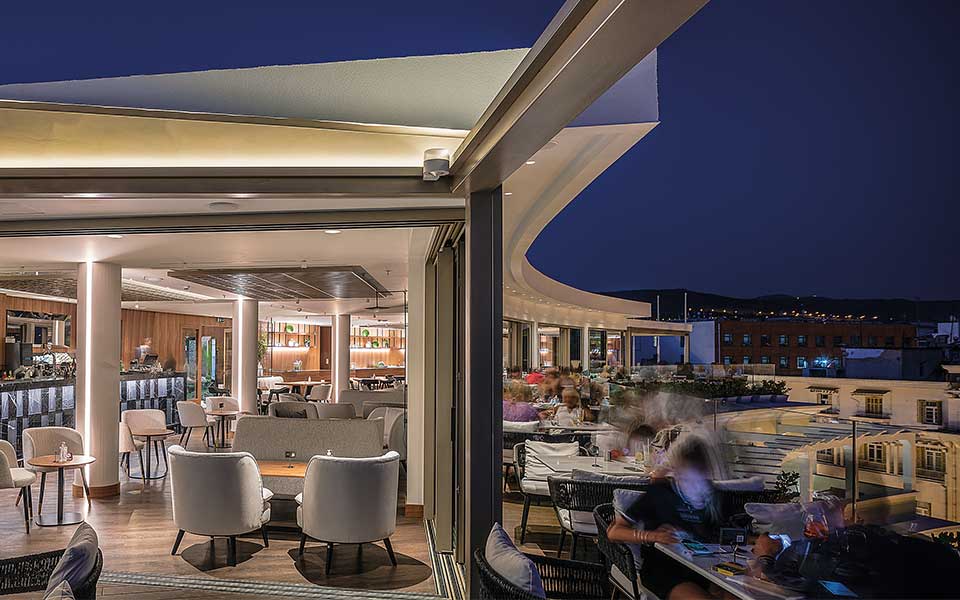
Orizontes Roof Garden: minimalist lines, furnishings in black and white, elegant aesthetic details and the added bonus of amazing views.
The art experience is further enhanced by original artworks from contemporary artists, on display in the hotel’s public spaces. Works by Eleni Zouni, Yiannis Michailidis, Christos Michailidis, Achilleas Papacostas and Elli Koutsoukeli, as well as pieces from the collection of Yiannis Retsos, adorn the common areas. The atmosphere of the city and its people, and in particular the mood of the ‘70s, is conveyed by the unique photographs by Yiannis Kyriakidis hanging on the walls of the mezzanine lobby.
From the Orizontes Roof Garden Restaurant, diners enjoy unique panoramic views: Aristotelous Square, the Thermaic Gulf, and mythical Mt Olympus in the distance form the backdrop for an unforgettable stay. That is, after all, the goal of the redesign, “to enrich the art of hospitality and to converse with the city and its people.”
This article first appeared in the print issue Greece Is Thessaloniki 2020 with the title “Electra Palace Thessaloniki: A Dynamic Return”. The magazine, along with other past issues, is available for order at our eshop.
Trace St. Paul the Apostle’s journey...
From postmodern bougatsa to wood-fired pizza...
Blending laid-back luxury with coastal charm,...
A Thessaloniki expert selects 13 spots...